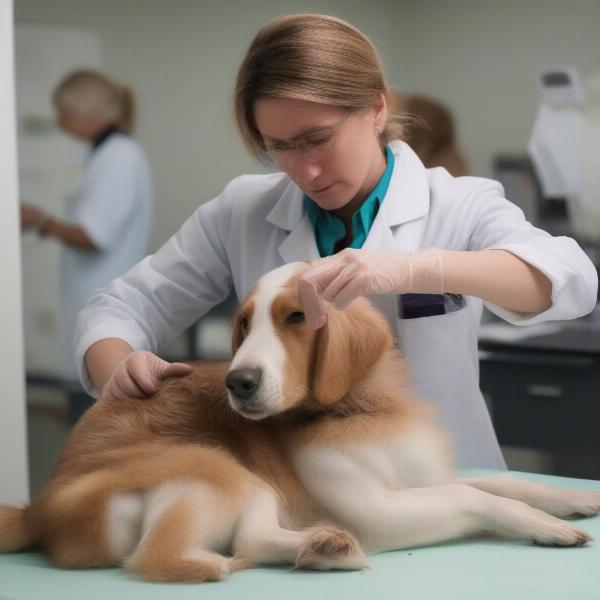Dog allergies are a common concern for many pet owners. Symptoms ranging from itchy skin and runny noses to more serious reactions can be distressing for both the dog and the owner. A dog allergy home test offers a convenient way to try and pinpoint potential triggers, giving owners a starting point for managing their dog’s allergies. But how reliable are these tests, and what do you need to know before using one?
Understanding Dog Allergies and Home Testing
Allergies in dogs occur when their immune system overreacts to substances in the environment, called allergens. These allergens can range from pollen and dust mites to certain foods and even insect bites. A dog allergy home test typically involves collecting a saliva or hair sample and sending it to a laboratory for analysis. The results usually identify potential sensitivities to various allergens.
How Reliable Are Dog Allergy Home Tests?
While dog allergy home tests can be a useful starting point, it’s important to understand their limitations. These tests are not always as accurate as tests conducted by a veterinarian. False positives and false negatives can occur. A positive result doesn’t necessarily mean your dog is clinically allergic to that substance, but rather that they have antibodies against it. It’s crucial to discuss the results with your veterinarian to interpret them correctly and develop a suitable management plan. at home allergy test for dogs can provide more information.
How to Choose a Dog Allergy Home Test
With several dog allergy home tests available, choosing the right one can be overwhelming. Look for tests from reputable companies with clear instructions and a good track record. Consider the range of allergens tested and the turnaround time for results. Reading online reviews can also provide valuable insights from other pet owners.
What to Expect After Testing
Once you receive the results, consult your veterinarian. They can help you understand the findings and recommend the best course of action. This may involve dietary changes, environmental modifications, or medications. Remember, managing allergies is an ongoing process, and regular veterinary check-ups are essential.
Are Home Tests the Only Option?
No, home tests are not the only option for identifying dog allergies. Your veterinarian can perform intradermal skin testing or blood tests, considered more reliable than at-home options. While these tests may be more expensive, they can provide more accurate and comprehensive results.
Why See a Vet?
Veterinary intervention is essential for diagnosing and managing dog allergies effectively. They can rule out other underlying medical conditions, interpret test results accurately, and tailor a treatment plan specific to your dog’s needs.
 Veterinarian Examining Dog
Veterinarian Examining Dog
Living with a Dog with Allergies
food for itchy dog offers some excellent dietary options. Managing a dog’s allergies often involves a multi-faceted approach. This may include minimizing exposure to identified allergens, using hypoallergenic shampoos and bedding, regular cleaning of the home, and medications prescribed by your vet. hypoallergenic dog for sale may be an option for some individuals.
Conclusion
Dog allergy home tests can offer a convenient initial step in understanding potential allergy triggers. However, it’s essential to interpret the results with the help of a veterinarian and consider them as part of a broader diagnostic process. A comprehensive approach involving veterinary guidance, environmental management, and potentially dietary changes can significantly improve the quality of life for dogs suffering from allergies. Remember, a healthy and happy dog starts with informed and proactive care.
FAQ
- Can I treat my dog’s allergies without a vet? While you can make some environmental changes, it’s crucial to consult a vet for proper diagnosis and treatment.
- Are dog allergy home tests accurate? They can provide some insights, but they are not as accurate as veterinary tests.
- What are common dog allergens? Common allergens include pollen, dust mites, certain foods, and insect bites.
- How can I manage my dog’s allergies at home? Regular cleaning, hypoallergenic bedding, and minimizing exposure to allergens can help. hot dog mini are a great occasional treat but be mindful of ingredients.
- What should I do if my dog’s allergies persist? Consult your veterinarian for further evaluation and adjustments to the treatment plan.
- How often should I test my dog for allergies? Discuss the frequency of testing with your veterinarian based on your dog’s individual needs.
- Are there any side effects to dog allergy home tests? Generally, these tests are non-invasive and safe, but always follow the instructions carefully.
About ILM Dog
ILM Dog is your trusted international resource for all things dog-related. We offer expert advice on dog breeds, health, training, nutrition, grooming, and more! We are passionate about providing pet owners with the information and resources they need to care for their furry companions. From choosing the right breed to understanding complex health issues, ILM Dog is here to support you every step of the way. healthy dog food toppers can help entice a picky eater. Contact us today at [email protected] or +44 20-3965-8624.